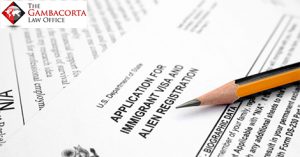 If you have been employed by a company and you are working for a salary; you may have been asked to complete the Form I-9. The purpose of this form is for employers to verify that their employees or foreign workers are eligible to work in the United States according to U.S. immigration laws.
If you have been employed by a company and you are working for a salary; you may have been asked to complete the Form I-9. The purpose of this form is for employers to verify that their employees or foreign workers are eligible to work in the United States according to U.S. immigration laws.
Filling out a Form I-9 may appear easy but, immigrants must carefully examine all the questions within that form and make sure that they include correct information.
If by any chance you check any incorrect boxes that suggest you are a U.S. citizen, this can affect you in the future and could be your ticket to deportation from the country.
Options Found on Form I-9
The Form I-9 includes four boxes that give employers the option to state why he or she qualifies for employment in the U.S. Previous versions of the Form I-9 have provided boxes that gives the option to check “citizen or national.”
The most recent version of Form I-9 divides the citizen or national sections into two individual boxes. Other options include Lawful Permanent Resident (LPR) and Alien Authorized to Work.
As long as you are working with a U.S. employer you will need to choose from these four options. If you are not a citizen, do not falsify your personal information; if caught there are penalties that follow and they are unfavorable.
Learn about Instructions for Employment Eligibility Verification Form I-9
Do Not Lie About Your Current Status
There have been innumerable times when foreign nationals in their excitement of getting a job have checked the box for either ( U.S. citizen or national) found on Form I-9; Little do they know the consequences that can follow later on.
One day, they may be able to apply for a green card either through a willing sponsor, maybe their employer or a United States Citizen spouse; if you wrongly checked a box in the past it can mean trouble with the U.S. immigration. Once you are found inadmissible by an immigration court judge, you will then need to apply for a waiver to fight your case.
Every person filling the Form I-9 must take into consideration that the U.S. Immigration and Nationality Act makes any immigrant responsible who, “represents or in any case has represented” himself or herself as a United States Citizen for the basis of obtaining any U.S. government benefit.
Once USCIS observes that an applicant for a green card has submitted wrong information of any kind in an application form they will immediately become inadmissible or ineligible for a U.S. green card and can be arrested. Lying about about your current status can get you in trouble if you say you are a U.S. citizen and you are not.
Exceptions When Found with Misrepresentation of U.S. Citizenship
There are three instances when found with “Misrepresentation of U.S. Citizenship” may not be applicable to a person:
- The misrepresentation of U.S. Citizenship was stated before the reformation of the laws. This specific ground of inadmissibility was established until September 30, 1996. This means that whether you gave such false statement on or before September 30, 1996 you can still be penalized if you directly submitted your fraudulent information to a U.S. immigration officer.
- If for Some Reason You Thought You Were a U.S. Citizen. The Child Citizenship Act of 2000 also states that there is an exception to inadmissibility if you made your false statement proclaiming to be a U.S. citizen when you were a child, you resided in the U.S. with a green card (LPR) before the age of 16, or both of your parents were citizens and you thought that gave you the right to become a U.S. citizen.
- You amended your inaccurate information immediately. If in a timely manner you went to fix the incorrect information then you may not be deemed inadmissible.
Situations like these should be a learning experience. Every foreign national from another country who intends on completing an application for either a nonimmigrant or immigrant U.S. visa must thoroughly go through the questions found in the forms. If you have any doubts regarding the questions on the Form I-9, seek legal counsel.
Working with an Experienced Immigration Law Attorney
The Gambacorta Law Office and team are here to help you avoid a slight error on your I-9 Form or U.S visa application form of any classification, whether immigrant or nonimmigrant.
Feel free to call immigration law attorney at 847-443-9303. Our offices are located in Arizona and Illinois.

